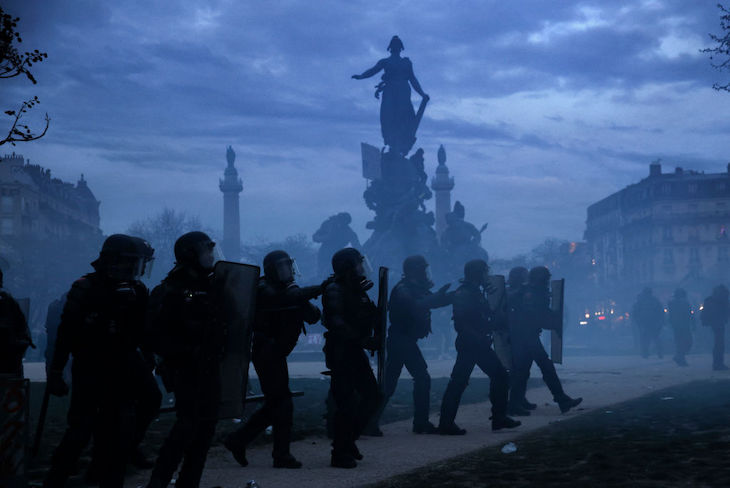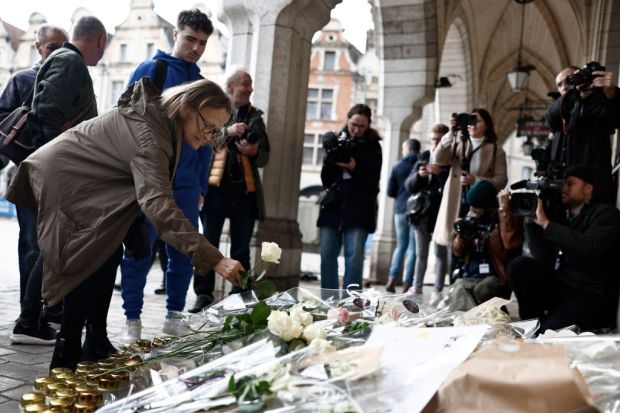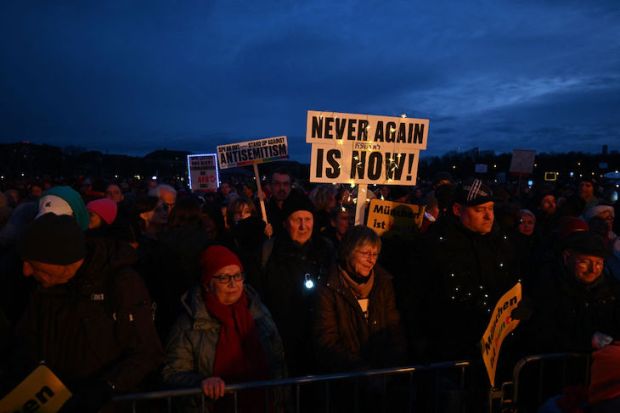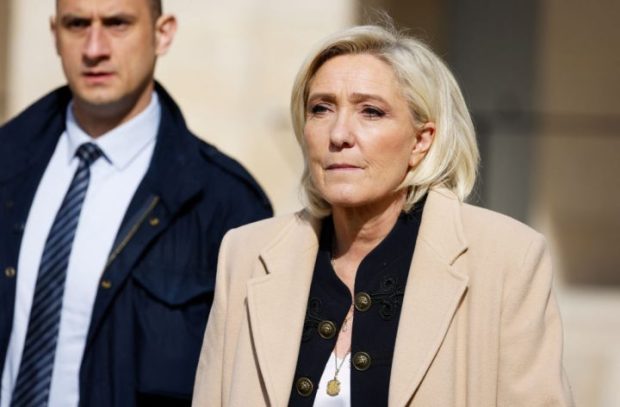Stéphane Rozès, the author of a book entitled ‘Chaos’, was on French radio this week receiving congratulations for being a visionary. The chaos which he described in his book, published last November, is now being played out in France, as hundreds of thousands of people take to the streets. Asked to explain its cause, Rozès explained that it has been building since 1992, the year France signed the Maastricht Treaty, the beginning of the European Union.
Rozès is not alone in this view. One of France’s best known philosophers, the left-wing Michel Onfray, has been saying the same thing for years.
‘France died in 1992, the date of the Maastricht Treaty,’ he said in an interview in 2018. ‘We gave up our sovereignty for a liberal supranational managed by a very autocratic device that has the money, therefore the media, therefore the opinion: what I call the Maastricht State.’
Onfray was naturally delighted with Brexit. One week after the Leave vote, he was one of 20 French intellectuals who signed a declaration demanding France renegotiate its Treaty with the EU.
Saluting the ‘courage’ of the British people in voting to leave the EU, the signatories called it ‘a slap in the face for the technocratic drift in which the current European Union has allowed itself to be trapped for at least three decades’.
Insulting the proles is never a wise move for a French president
They urged the then president, the Socialist François Hollande, to draw the right lesson from the triumph of the Leave vote, namely that ‘citizens no longer accept being governed by unelected bodies, operating in total opacity’. Brexit should serve as the catalyst to reconstruct the European project, focusing on ‘three crucial issues whose neglect has led to the collapse of the current European construction’. These were democracy, prosperity and strategic independence.
Hollande did not heed the warning; on the contrary, he doubled down on Europe, making no secret of his disapproval with Brexit. He was, of course, encouraged in his rhetoric by the behaviour of many MPs in Westminster, who did their best between 2016 and 2019 to keep Britain in Europe.
His successor in the Élysée, Emmanuel Macron, has been just as contemptuous. The decision to Leave was, he declared, based on ‘lies and false promises’.
What is the EU if not a project built on lies and false promises? ‘There must be no formal hierarchy between the institutions, nor too rigid a framework for their action,’ stated President François Mitterrand in a speech to the European assembly in May 1992, three months after the Maastricht Treaty had been signed. ‘Let us show flexibility and adaptability.’
Mitterrand also demanded ‘equal dignity between all member states’ and cautioned against ‘the risks we would run if riches, wealth, influence, the means to act, the financial resources were all concentrated in a small group’’.
It didn’t take the French left long to realise that the EU was indeed concentrating the wealth and the influence in a small group. So when they were asked to vote ‘yes’ or ‘no’ to the EU Constitution in a 2005 referendum, they formed the bulk of the 54 per cent of the population who were opposed. Parliament ignored their will and passed the Constitution – repackaged as the Lisbon Treaty – in 2007 without putting it to the people.
Most Socialist MPs went along with the perfidy but a few warned of grave repercussions. ‘Our fellow citizens want the country to be run by its elected representatives and not by a European and national technostructure that escapes all democratic control,’ said Georges Sarre, a minister in Mitterrand’s second government. He had been a prominent ‘No’ campaigner in the referendum, publishing a book entitled ‘Europe against the left’
The disaffection has therefore been brewing for years, on the right as well as the left. If the latter rage against the neoliberalism of the EU, the right’s anger is stoked by the erosion of French culture and, in particular, mass immigration. ‘There is no French culture’, declared Macron in 2017, the same year he derided workers as ‘slackers’, thereby achieving the rare feat in France of uniting the right and the left in outrage.
Insulting the proles is never a wise move for a French president but arguably Macron’s bigger mistake since taking office is his unshakeable belief in the European vision. Yet he knows that the people don’t share his view; in a famous BBC interview in January 2018, he acknowledged that, given the chance, the French would also have likely voted to leave the EU.
But he would never dream of giving them that chance. So the anger of the people grows, not only with Macron but with all the mainstream political parties who are just as committed to the EU. Why else have the Socialists and the Republican Parties been reduced to political also-rans in the last decade?
Instead, voters have turned to Eurosceptic leaders, such as Jean-Luc Mélenchon and Marine Le Pen. In December, Mélenchon claimed it was one of his party’s MEPs, Manon Aubry, who helped reveal the alleged corruption in the EU, what has since been dubbed ‘Qatargate’. Thanks to her, said Mélenchon, ‘we keep our idea of Europe alive’. It also doesn’t go down well with French Eurosceptics that the country contributes €25 billion (£22 billion) to the EU budget and receives only €15 billion (£13 billion) in return.
The word I have heard and seen most often during the recent protests across the country is ‘Revolution’. It’s particularly common among the young, such as student union leader Imane Oulehadj, who explained that he and his peers are ‘taking to the streets to build another, more just society.’
But the revolution that the French people need if they are to build their fairer world of liberty, equality and fraternity isn’t against the man in the Élysée but against the people in Brussels. It was they, after all, who in 2019 recommended to Macron that he reform France’s pension system.
Brexit in its current form is not perfect for many of the 17.4 million people who voted to leave. But at least Britain has broken free from an unaccountable and unelected elite, and regained some of its sovereignty. France remains, and for as long as it does so will the chaos.
Got something to add? Join the discussion and comment below.
Get 10 issues for just $10
Subscribe to The Spectator Australia today for the next 10 magazine issues, plus full online access, for just $10.





















Comments
Don't miss out
Join the conversation with other Spectator Australia readers. Subscribe to leave a comment.
SUBSCRIBEAlready a subscriber? Log in